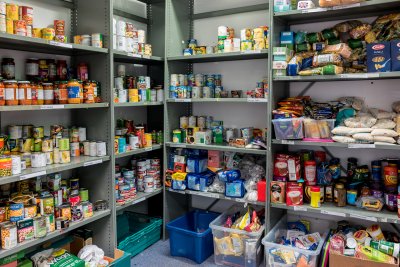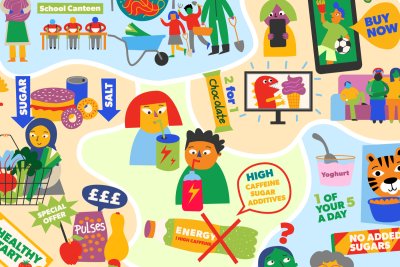Flagship study finds a million children experienced destitution in the UK last year
A major new report by the Joseph Rowntree Foundation (JRF) reveals a shameful increase in the level of destitution in the UK. The number of people experiencing destitution increased by 61% from 2019 to 2022, with an even larger increase in the number of children experiencing destitution. This follows another rapid acceleration in the level of destitution from 2017 to 2019.

As a general election approaches, JRF is calling on all parties to make tackling destitution a priority and set out their plans to reverse the appalling rise in hardship across our country.
- Around 3.8 million people experienced destitution in 2022 – a 61% increase since 2019
- This includes around 1 million children – an 88% increase since 2019
- The number of people experiencing destitution in the UK has more than doubled in the last five years – up from 1,550,000 in 2017
- Since 2017 the number of children experiencing destitution has almost tripled – an increase of 186%
- Almost two thirds of people who experienced destitution in 2022 have a disability or chronic health problem
- The social security system is not protecting people from destitution: 72% of those destitute are in receipt of benefits
People are considered destitute if they have not been able to meet their most basic physical needs to stay warm, dry, clean and fed. This can be because they either lack necessities like clothing, heating, shelter or food. Or because their income is so extremely low that they are unable to purchase these items for themselves.
The report is the fourth in a series of Destitution in the UK studies, published regularly since 2016 by JRF and undertaken by Heriot-Watt University, in partnership with Kantar Public.
Paul Kissack, Chief Executive of the Joseph Rowntree Foundation, said:
"A million children experienced destitution last year – a number that has almost doubled since 2019. Across our country we are leaving families freezing in their homes or lacking basic necessities like food and clothing. Such severe hardship should have no place in the UK today – and the British public will not stand for destitution on this scale.
“The Government is not helpless to act: it is choosing not to. Turning the tide on destitution is an urgent moral mission, which speaks to our basic humanity as a country, and we need political leadership for that mission. That is why we are calling for clear proposals from all political parties to address this challenge with the urgency it demands.”
Professor Suzanne Fitzpatrick, from the Institute for Social Policy, Housing, Equalities Research (I-SPHERE) at Heriot-Watt University, said:
“This is the most comprehensive and detailed study of its type but having robust data on destitution is meaningless unless acted upon at the highest levels. The number of children living in destitution in this country has nearly trebled since 2017. This is morally reprehensible and must act as a stark wake up call to policymakers across the political spectrum. No one of any age should be destitute in the UK today.
“To have these horrifying levels of destitution in a country like ours is a political choice. The scale of extreme material hardship we have uncovered reflects the state abdicating its responsibility to ensure that all members of our society are able to meet their most basic physical needs to stay warm, dry, clean and fed without having to rely on charitable help. There must be immediate action from all levels of government to tackle this social emergency.”
Who is experiencing destitution in the UK?
With around 3.8 million people – including around a million children – experiencing destitution in 2022, severe hardship is now commonplace. Around six in ten (2.3 million) are UK nationals without complex needs, with migrants and UK nationals with complex needs making up the remainder.[1]
The cost of living crisis has exacerbated an already dire situation, contributing to a broadening as well as deepening of destitution.
While single working age adults are most likely to be experiencing destitution, there have been sharp rises in destitution among other groups. The number of lone parents experiencing destitution close to tripled between 2019-2022. This means that 11% of all households in the UK who experienced destitution in 2022 were lone parent households.
Almost two thirds (62%) of people experiencing destitution have a disability or chronic health problem that limits their day-to-day activity, up from 54% in 2019. These health conditions are now much more likely to significantly limit people’s lives than in 2019.
72% of destitute households are in receipt of social security benefits. 56% report receiving income from Universal Credit.
Around 12% of households experiencing destitution in 2022 were Black, Black British, Caribbean or African-led, despite comprising only 4% of the population.
Why is destitution rising in the UK?
A combination of extremely low incomes, a threadbare social security system, the increasing cost of basic essentials and high levels of debt has led to this rapid increase in destitution.
Over half of destitute households (57%) have a weekly income of less than £85 a week.
More than a quarter (27%) have no income at all.
Nearly three quarters of destitute households receive income from benefits – evidence that after more than a decade of cuts and freezes the social security system is so inadequate it is failing to protect people from destitution – and in too many cases pushing them into it.
The sharp rise in destitution reflects in particular an increase in the number of people lacking basic necessities, especially food and heating. The price of these essentials has soared, making them unaffordable for more people on very low incomes.
Ad-hoc support from the government, first during the pandemic and now to help with the cost of living, has done nothing to slow the acceleration in the level of destitution since 2019.
Debt is another important driver of destitution: over half of people experiencing destitution have problem debts or arrears. Debts within the social security system, for example from advances and historical overpayments, are a particular issue. Others include council tax debts and utilities arrears, as well as housing-related debts like rent arrears. Problems with consumer credit like credit card debt appear to be an increasing issue too.
Many debts are recovered through deductions from benefits payments. This reduces the already meagre amount people receive from the social security system to such an extent that many are pushed into destitution.
Where are people experiencing destitution in the UK?
Destitution has increased in all regions of England. London has the highest levels of destitution, followed by the North East and the North West. The rate of increase has been particularly rapid in London and the West Midlands.
The rate of destitution has risen more quickly in Wales than anywhere else since 2019, with the exception of London. Destitution has increased much more slowly in Scotland, with the introduction of the Scottish Child Payment and boosts to local welfare likely to have offered some protection.
Newham in London has the highest rate of destitution of any local authority in the country. Manchester has the second highest rate, with Middlesbrough third. A full list of the top 30 can be found in the accompanying notes.
Recommendations
JRF is calling on all parties to make tackling destitution a priority and set out their plans to reverse the appalling rise in hardship across the country.
Universal Credit should, at a minimum, always enable people to afford essentials. But right now it is not even protecting people from destitution.
The UK government should introduce an ‘Essentials Guarantee’ into Universal Credit, to ensure that everyone has a protected minimum amount of support to afford essentials like food and household bills. This would mean that deductions from benefits, such as those to repay debts to the government, would not be allowed to reduce support below this level.
While working towards this, the UK government should lower the current limit on benefits deductions, reform sanctions so that people are not left with zero or extremely low income, and ensure that people can access the disability benefits they are entitled to.
Cash-first emergency financial assistance should be available in all areas, along with free and impartial advice services to address the crushing debt, benefits and housing issues that keep people destitute. This should also be available to people with ‘no recourse to public funds’.
For a copy of the report or to arrange interviews please contact the JRF press office: pressoffice@jrf.org.uk / 01904 615 958
Notes to Editors
- The research was conducted by the Institute for Social Policy, Housing, Equalities Research (I-SPHERE), Heriot-Watt University in partnership with Kantar Public. It was funded by JRF.
- Data collection for the report comprised case studies in 18 locations across the UK, including a survey of 3,702 users of 111 crisis services (in October/November 2022).
This was combined with in-depth interviews with 31 survey respondents in May and June 2023, all of whom were experiencing destitution at the time they completed the survey. Secondary analysis of over 40 quantitative datasets enabled the scaling up of statistical findings from these case studies to national level.
- The list of the 30 local authorities with the highest rates of destitution is here:
|
Rank |
Local authority |
Rank |
Local authority |
|
1 |
Newham |
16 |
Tower Hamlets |
|
2 |
Manchester |
17 |
Liverpool |
|
3 |
Middlesbrough |
18 |
Birmingham |
|
4 |
Leicester |
19 |
Westminster |
|
5 |
Nottingham |
20 |
Wolverhampton |
|
6 |
Brent |
21 |
Blackburn with Darwen |
|
7 |
Newcastle upon Tyne |
22 |
Hounslow |
|
8 |
Southwark |
23 |
Haringey |
|
9 |
Kingston upon Hull, city |
24 |
Camden |
|
10 |
Luton |
25 |
Rochdale |
|
11 |
Barking and Dagenham |
26 |
Glasgow City |
|
12 |
Salford |
27 |
Sandwell |
|
13 |
Coventry |
28 |
Oldham |
|
14 |
Slough |
29 |
Hackney |
|
15 |
Ealing |
30 |
Blackpool |
- JRF recently conducted a series of a series of focus groups with financially insecure swing voters in key constituencies to understand their views on deep poverty and hardship. These voters, hard hit by the cost of living crisis, saw hardship as a top priority but believed politicians aren’t taking the issue seriously enough.
- The Joseph Rowntree Foundation works to speed up and support the transition to a more equitable and just future, free from poverty, in which people and planet can flourish. For more information visit www.jrf.org.uk
- JRHT provides housing and care services and demonstrates innovative approaches to both. For more information visit www.jrht.org.uk
- JRF is on Twitter/X. Keep up to date with news and comments @jrf_uk
- I-SPHERE is on Twitter/X @ISPHERE_HWU
Published Friday 27 October 2023
Food Poverty: Millions of people in the UK struggle to get enough to eat. We’re working to change that through people-powered projects and campaigns that tackle the root causes of food poverty and ensure everyone has dignified access to healthy, affordable food.





